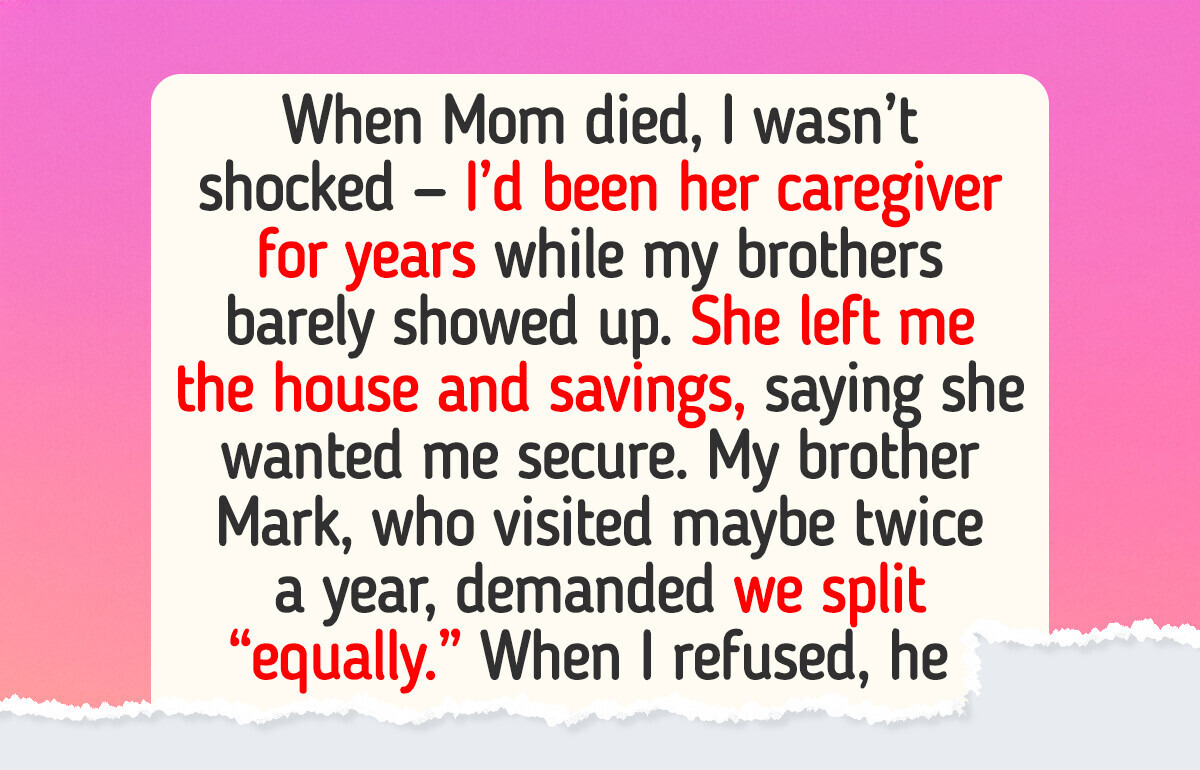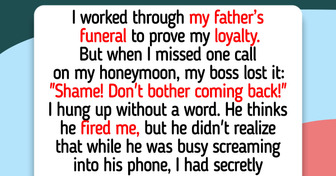Hopefully your mom specifically left maybe $10.00 to your brothers so they can't say she forgot them, Get a probate lawyer ASAP
My Mom Left Me Everything in Her Will — Now My Brother Wants My Inheritance

Inheriting from a parent is never just about money — it’s tangled with grief, memories, and family dynamics. But what happens when relatives who’ve been absent for years suddenly appear, demanding their share? One of our readers told us how her mother’s last wish for her turned into a battle with her own brothers.
This article is intended for entertainment purposes only. We make no representations or warranties regarding the completeness, accuracy, reliability, or safety of the content provided. Any actions taken based on the information in this article are strictly at the reader’s own risk. We assume no responsibility or liability for any loss, damage, or consequences arising from the use of this content. Readers are advised to exercise their own judgment, take appropriate precautions, and seek professional guidance if attempting to replicate any part of the content.
Her letter

Hi Bright Side Team!
When my mom died last year, it wasn’t sudden — I’d been her full-time caregiver for years. I moved back home, handled meds, cooked, cleaned, and sat up through countless ER runs. My brothers? Holiday visits and the occasional “thinking of you” text.
So when she left me the house and savings, I wasn’t surprised. Mom always said, “You gave up your life for me, and I want you secure.”
Enter my brother Mark. Barely came to visit twice a year, but the second he heard, he demanded we “split it three ways.” When I refused, he accused me of manipulating her, then sent a lawyer to contest the will.
Now my family’s split: half say I should share to “keep the peace,” half say stand firm. Am I protecting Mom’s wishes—or just destroying what’s left of this family?
Helena
Thank you, Helena, for sharing with us and our readers!
Contesting a Will: What You Should Know.

Inheritance disputes can tear families apart, and few things feel as personal as questioning a loved one’s final wishes. But what does it actually mean to contest a will? Here’s a simple guide.
What Does “Contesting a Will” Really Mean?
Contesting a will is when someone takes legal action to challenge its validity or the way the estate has been divided.
People usually do this when they believe the will doesn’t truly reflect what the deceased wanted — or if it leaves close family members without fair support.
The most common grounds include claims of undue influence, doubts about mental capacity, or suspicions of fraud and forgery.
Grounds for Contesting
A will isn’t always the final word. In some cases, it can be legally challenged — but only under specific circumstances:
Lack of capacity — The person making the will didn’t fully understand what they were signing, often due to conditions like dementia.
Invalidity — The will wasn’t properly written, signed, or witnessed, which can make it legally void.
Undue influence or duress — Someone pressured or manipulated the deceased into changing their wishes.
Fraud or forgery — The document, or even the signature, was faked.
Financial dependency — Close dependents left out may still be entitled to financial support under the Inheritance Act (with a strict six-month deadline).
Challenging a will is possible — but it’s often complex, costly, and emotionally exhausting. The best way to prevent disputes later is simple: make sure your own will is clear, valid, and regularly updated.
Steps You Can Take Now.
- Find a probate lawyer
Don’t try to take this on alone. A solicitor or attorney who specializes in contested wills can explain your rights, assess your chances, and make sure you don’t miss important deadlines. - Gather strong evidence
This could include medical records from the time the will was signed, witness statements (from neighbors, doctors, or the drafting lawyer), and any older wills, letters, or notes that reflect the deceased’s true wishes. - Know the time limits
In many places, you only have about six months from probate being granted to challenge a will. While there can be exceptions, acting fast gives you the best chance. - Look after yourself
Disputes like this are draining — especially while you’re grieving. Lean on therapy, support groups, or trusted friends to help you stay steady during the process. - Move quickly
It’s always easier to contest a will before probate is finalized. Waiting too long can make things more complicated, though it’s still possible in some cases. - 💡 Bottom line: contesting a will is never easy, but with the right support and timely action, you can protect your loved one’s wishes — and your own peace of mind.
In the end, the inheritance wasn’t just about money — it was about loyalty, absence, and who really shows up when it matters most.
I’m Child-Free, and My Parents Chose to Leave Their Legacy to My Cousin—So I Turned the Tables
Comments
Where's that family that was so worried about keeping things together that they're telling you to keep the peace when your brother was ignoring your dying mom? Did any of them reach out to him and try to guilt him into keeping the family together by offering you a break and helping with your mother? No of course not. So ignore them.
Speak to a probate lawyer, your mother’s wishes should be followed. Don’t do anything to keep the peace, your brother is a greedy character.
Ha, why visit when you figure it's automatically split, betcha he would have been there a lot more if he thought his inheritance hinged on it. Something tells me even if she'd left you half of everything or some bigger percentage for your help and sacrifice, he still would have been in a ' money for nothing ' state of mind. Consult with a lawyer. Wadda you wanna bet there was a bit of excess spending going on there cuz he expected a windfall in the will.
Ok, he wants everything split, then fine. Now we need to split the cost of moms care.
The current 24-7 caregiver rate + therapy, housekeeper, cook ,
loss of income + any other cost or time that you contributed.
Then deduct that from his portion, and give him 30 days to pay the difference that the inheritance didnt cover.
Related Reads
My Son Wants to Kick Me Out on the Street to Accommodate His New Family

15 Times “Just Tidying Up” Turned Into a Scene Straight Out of a Movie

15 Times People Refused to Be Mean—And Kindness Proved More Powerful

I Demand That My 16 Y.O. Daughter Pay for Rent and Groceries, Nothing in Life Is Free

12 Moments That Remind Us to Stay Kind Even When Life Isn’t Gentle

10 Dating Stories That Started Like Rom-Coms but Ended Like Horror Movies

I Refused to Join a Work Call From My Honeymoon—I Froze the Entire Office

My MIL Tried to Humiliate Me at the Altar—By Morning, She Wasn’t Laughing

I Refuse to Cook Vegan Meals for My Stepson—And It Turned Into a Nightmare

My Parents Refused to Fund My Education, So I Turned the Tables on Them

14 Powerful Kindness Stories That Restored Hope in Tough Times

I Refuse to Return My Late Colleague’s Paycheck, Now His Widow Is Furious
